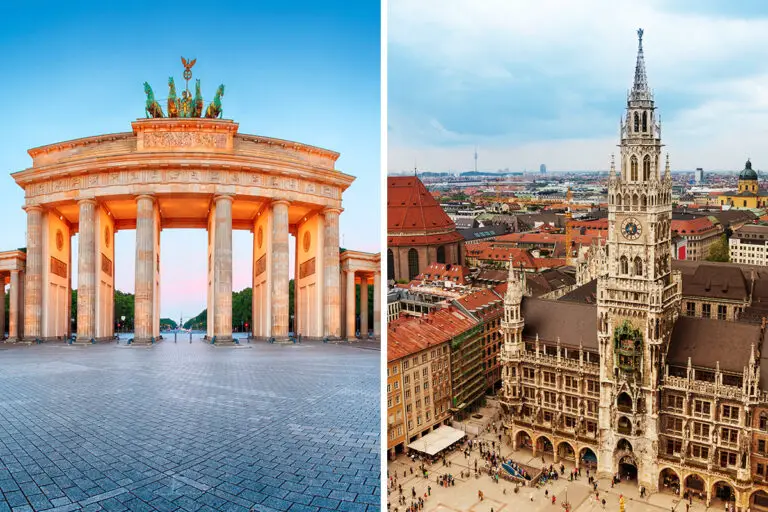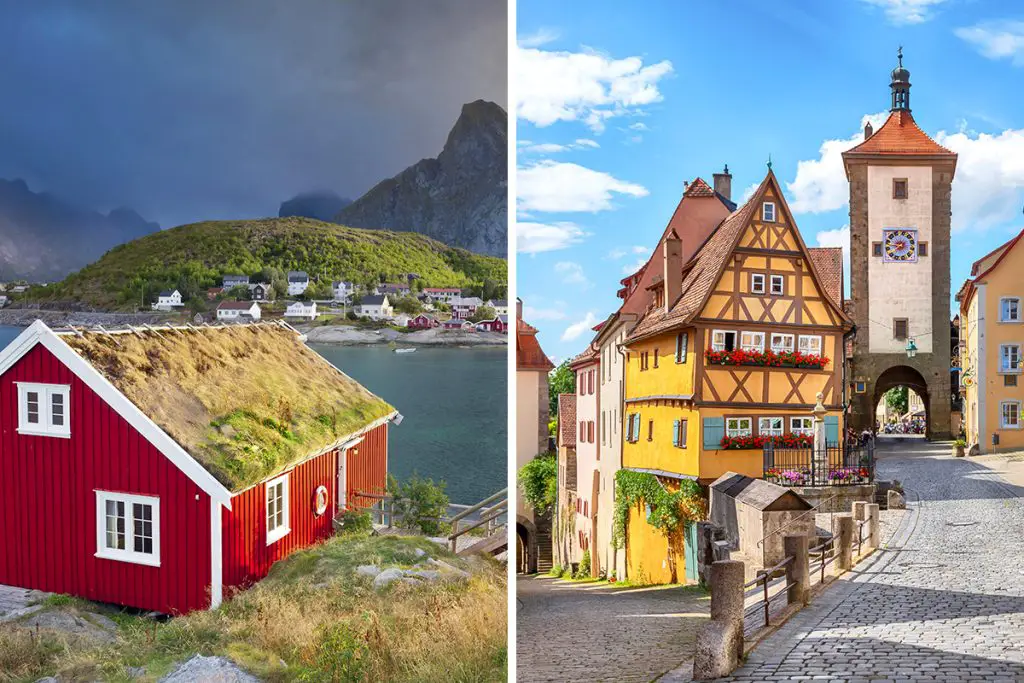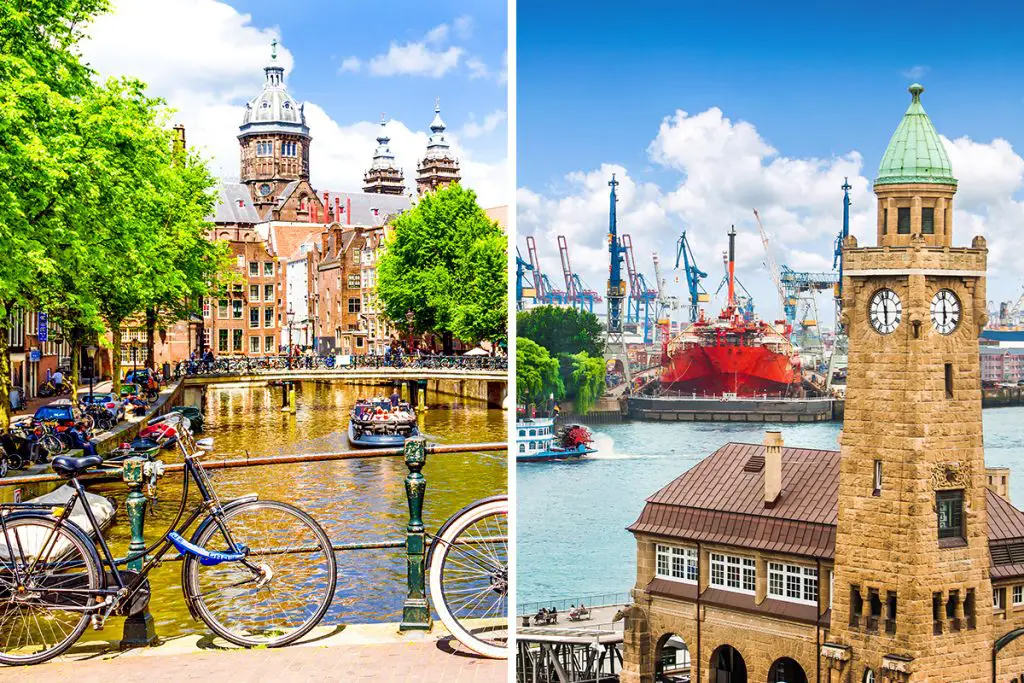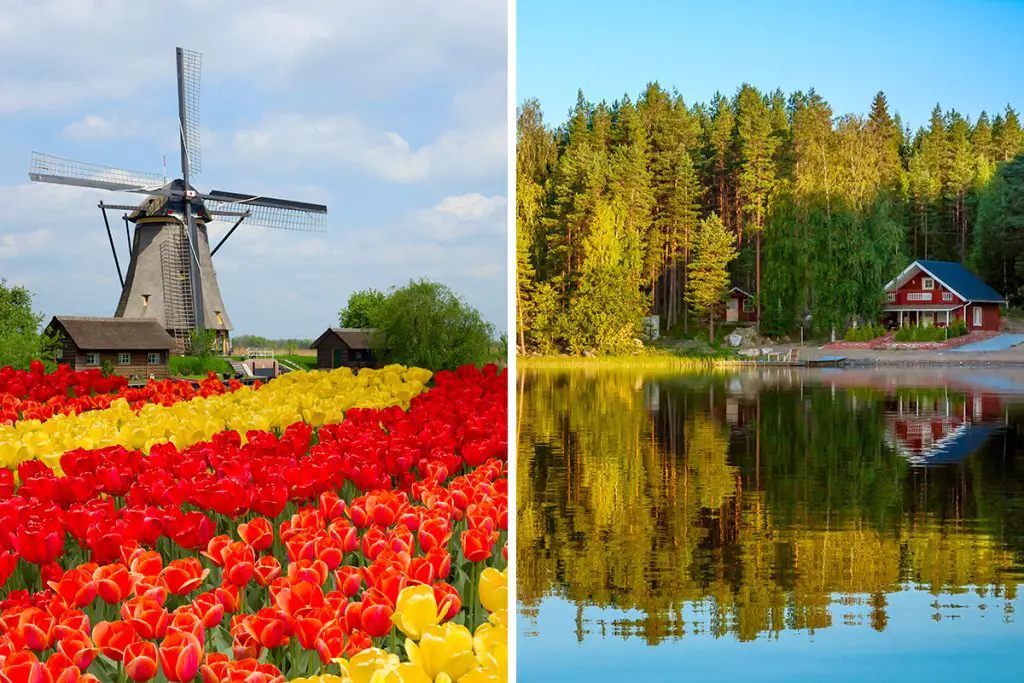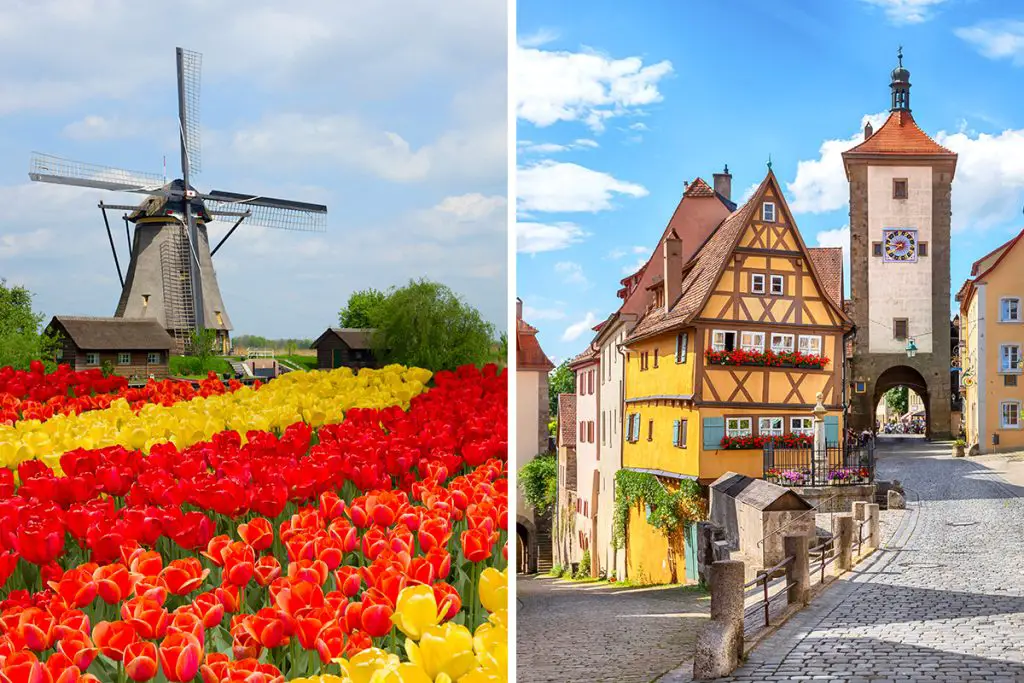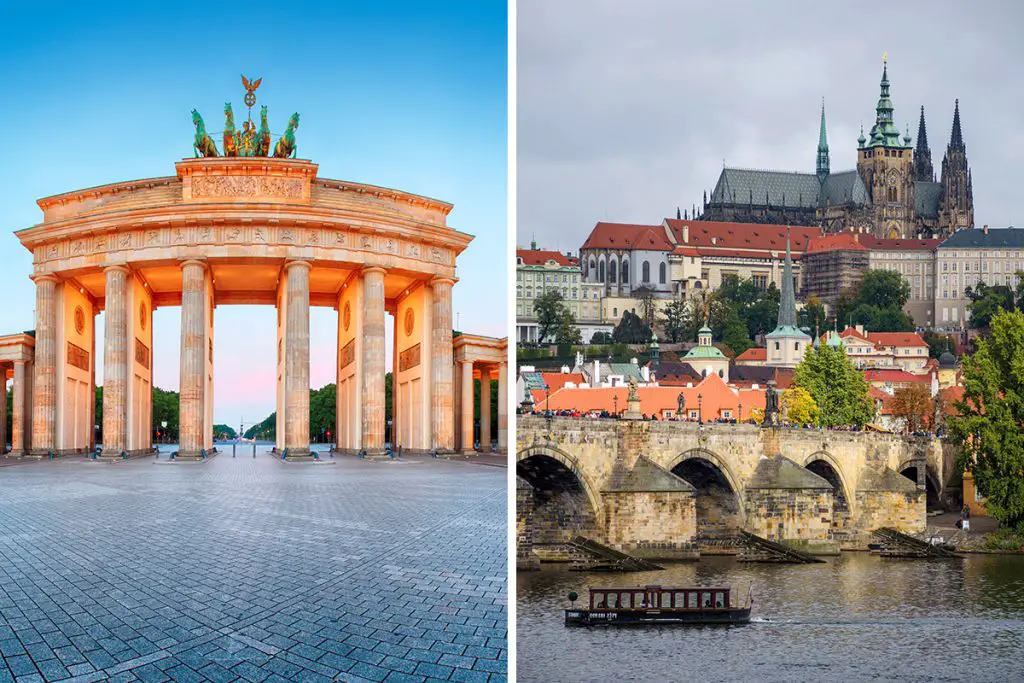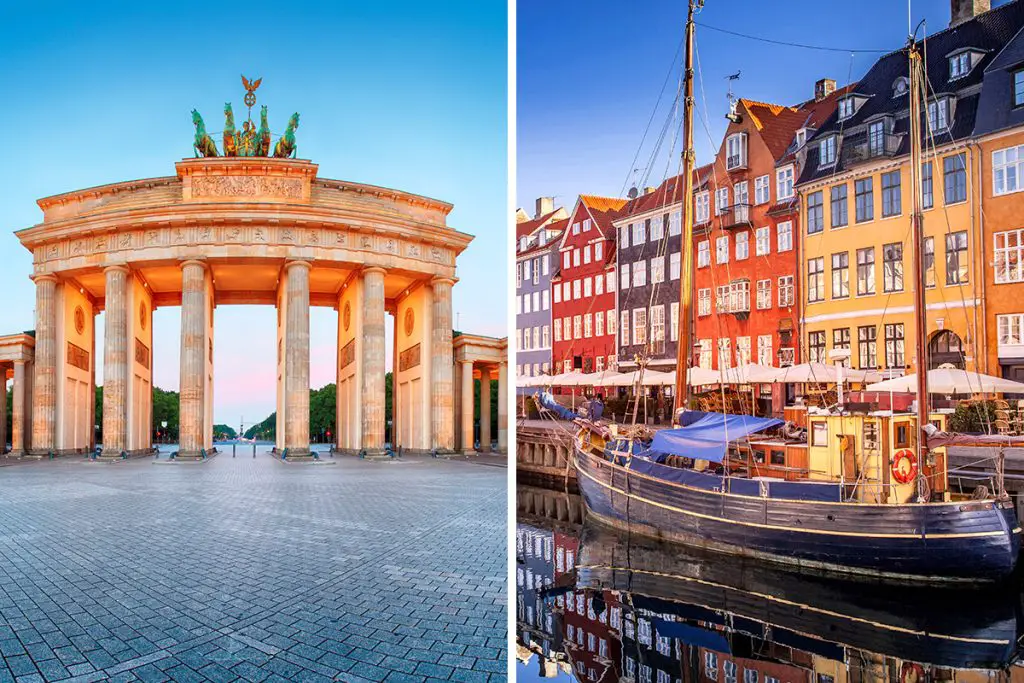Berlin is a busy and ever-lively hotpot of various cultures. Though it’s widely considered to be a coveted nightlife mecca, this is only one aspect of this multifaceted city.
There are plenty of other ways to get to know Berlin, from its historical sites to its thriving food scene. With so many allures, a week isn’t enough for you to uncover Berlin’s mask.
Meanwhile, Munich is often overlooked. Nestled in the affluent Bavarian region, Munich has an intoxicating old-town charm. Other than the famous beer halls, Munich is well-loved for its centuries-old architecture and traditions.
Both cities share several allures, so you won’t go wrong with picking either one. But one of these cities is the better pick depending on what you want out of your trip.
Berlin
Nicknamed the “city of freedom” Berlin stands proud as one of the most liberated cities in the world. With a nonjudgmental attitude, Berlin is a welcoming city that visitors from all walks of life love.
But this love for Berlin goes beyond its outlook on life and outrageous nightlife. Berlin is a city for everyone, from art lovers to culture vultures to history buffs, and everyone in between.
Vibrant, cultured, and incredibly varied, Berlin has tons of reasons for you to come. But it has many more reasons to urge you to stay much longer as there are a plethora of ways to get to know the city.
What Makes Berlin Unique?
A City With a Well-Known Past
Berlin is a city with thousands of stories to tell. It was the epicenter of many of history’s most tumultuous pasts, something you learn about in textbooks. While there are tons of ways to discover the city, uncovering its history is an experience you won’t find elsewhere.
Berlin had gone through two wars, each leaving remnants in the city—
Around Berlin, you may stumble upon brass stones in the streets. Known as stolpersteine, these mark the workplaces or homes of the Holocaust victims.
Further honoring these Jewish individuals, you can visit the Holocaust Memorial. This site is a sprawling land with rows of concrete blocks parallel to each other. If you want to learn more about World War II, the city has tons of other sites like this to make sure it’s never forgotten.
Among the most famous attractions in the city is the Berlin Wall. This structure stood as a symbol of the conflicting ideologies during the Cold War.
This concrete barrier divided east and west Berlin. In 1989, it was almost entirely knocked down. But you can still visit parts of the original wall today. Especially in the East Side Gallery, where the largest part of the wall still resides.
Arguably the city’s most famous landmark is the iconic Brandenburg Gate. Modeled after the Acropolis in Athens, this structure is Berlin’s symbol and sits right at the heart of the city.
But more than that, the Brandeburg Gate stands as a symbol of peace and unity. After demolishing the Berlin wall, this gate opened again to reunite the east and west. Brandenburg Gate welcomed the celebration of over 100,000 people after that.
Though these historical sites are the most visited ones in Berlin, not all stand as remnants of wars—
There’s the Reichstag, a historic German parliament building that you can explore via guided tours. You can marvel at the eclectic architecture of the Kaiser Wilhelm Memorial Church. And among the most stunning structures in Berlin is the Berliner Don, an incredibly ornate 20th-century cathedral.
A Cultural and Artistic Powerhouse
One of Berlin’s strong suits is endless entertainment for the culture vulture in you. With over 180 museums alone, Berlin spoils you both for quantity and quality. And this doesn’t count the other iconic landmarks that give you a taste of Berlin’s multifaceted arts and culture scene.
At every corner of Berlin, you’ll find proof of the city’s reputation as a cultural center. From UNESCO World Heritage Sites to art galleries to street art, you have a wealth of options to uncover Berlin’s artistic side.
There’s no better place to start your exploration than Museum Island. Nestled in the River Spree, this spot is home to five world-class museums, the most famous ones in the city. All within walking distance from one another are:
- Bode Museum
- Neues Museum
- Pergamon Museum
- Alte Nationalgalerie
- Altes Museum
Each of these world-renowned museums holds masterpieces that you can only find in Berlin.
The Neues Museum has one of the most recognizable ancient artifacts, the Bust of Nefertiti. The Pergamon Museum’s star is the Pergamon Altar which is a wonder of the ancient world. Bode Museum’s Coin Cabinet is one of the largest of its kind in the world, holding thousands of coins from every period.
With all the treasures that the Museum Island holds, it’s also a UNESCO World Heritage Site.
These aren’t the only museums that are worth the trip though, as some lie outside Museum Island.
There’s the Gemäldegalerie, home to an extensive collection of European masterpieces. This includes Rembrandt’s The Head of Christ. You can also head to the DDR Museum for an interactive take on the city’s history.
Berlin’s artistic side isn’t restricted to the walls of museums though. Urban art pulsates through the city’s streets, giving the city a burst of color.
Berlin is famous for the dynamic street art plastered across the city. For a city that prides itself in freedom and self-expression, its murals are a proud testament to this.
Whether funny, political, or downright random, the East Side Gallery, which was part of the Berlin Wall, is the best spot for these eye candy. But trendier spots of the city, like Kreuzberg, are also covered in gorgeous murals too.
One of Europe’s Nightlife Meccas
Throughout history, Berlin has always had a thriving night scene, even during wars. After the fall of the Berlin Wall, youngsters took over abandoned sites and transformed them into clubs. Tangled with the vibrant and liberal party culture that Germany has always had, this is the nightlife that you can still enjoy today.
Berlin is widely celebrated as being one of the top partying cities in Europe. With its “anything goes” attitude, Berlin is most famous for its outrageous night scene.
Owing to its wild reputation, Berlin’s nightlife is as liberal as it can be, offering from hedonism and burlesque to other more taboo attractions.
The city only becomes livelier when the sun sets. At every corner, you’ll see blinding neon lights and hear clubs blasting with upbeat music as you become part of the crowd.
For the locals, clubbing is not something you do on a whim. They treat it as a lifestyle and a hobby to dance and mingle with other people. And with Berlin’s famous techno scene, there’s always a reason to dance in the city.
If the city’s nightlife is too extreme for you, Berlin still offers a plethora of choices for a chill night out. Hang out at an authentic German pub or some open-air entertainment venue, and everything in between. Berlin’s nightlife isn’t only for the party animals, but also everyone.
What’s more enticing about Berlin’s night scene is that you’ll have a whole night of uninterrupted fun. Berlin’s nightlife spots have no closing time!
Nature Right at Your Doorstep
Many of the world’s busy city capitals are gray concrete jungles. But this doesn’t apply to the green-space-filled cityscape of Berlin. With over 2500 parks at your disposal, you’re constantly surrounded by lush greenery when walking around Berlin.
Each of Berlin’s magical parks has features to fit how you want to unwind.
Some are perfect for a barbecue, as some allow this, while others provide the equipment. Some of the best barbecue parks in Berlin are Mauerpark, Sommerbad, and Monbijoupark.
Others feature waterfalls, lakes, and other natural wonders for some outdoor fun. Viktoriapark is home to a majestic waterfall, perfect for a calming day out.
Urban parks are the perfect in-between to immerse yourself in nature with the convenience of city life. Tiergarten, sitting at the heart of the city, is Berlin’s largest park. It offers a wide variety of attractions, such as a zoo, a beer garden, and more!
But all are perfect for a picnic, as the massive trees provide tons of shade for you to relax under.
More than these, you can also get a tropical getaway in Berlin, even in the winter! About an hour away from the city center is the Tropical Islands Resort. This is the world’s largest indoor waterpark, keeping visitors warm no matter what time of the year!
The temperature inside this park is constantly balmy, at around 78 F (26 C). Full of waterslides, swimming pools, and white-sand beaches, this is the ultimate tropical paradise in Germany. There’s also a rainforest, tropical flora, and artificial sun to mimic the tropics.
The Rustic and Hearty Cuisine
Though underrated, German cuisine is luscious and hearty, satisfying every palate. Berlin, in particular, is a rising culinary hotspot in Europe. And its growing popularity as a culinary star is due to its incredibly varied and thriving food scene.
Berlin has over a dozen Michelin-starred restaurants for upscale gourmet dining. But sprinkled around the city are tons of street food stalls, offering generous portions for under five dollars.
Berlin, being a German city, offers a plethora of meat dishes, not just sausages. But it’s also making a name for itself as being one of the top cities for vegans. With countless innovative vegetarian and vegan spots, Berlin caters to every diet.
The city’s diverse food scene doesn’t stop there as Berlin gives you a taste of international flavors worldwide. Whether you’re craving dumplings, ramen, or Turkish baklava, Berlin answers your cravings.
Despite a plethora of food and restaurant options, munching on the local favorites is truly the best way to get a taste of Berlin.
An obvious choice is a currywurst, a cheap eat that packs a punch in taste. This is a pork sausage that’s flavored with curry powder and spicy ketchup. Sliced up and served with a side of fries, it’s the perfect snack on the go.
Berlin also has a large Turkish community that made doner kebabs a Berlin food-scene staple. A dish made with succulent meat, a blend of spices, topped with veggies, salad, and sauce, a doner kebab is a feast in your mouth. And the best part of this dish is that it also doesn’t break the bank.
You’ll also want to grab a plate of Käsespätzle, which is widely considered a German mac and cheese. Made up of soft noodles and cooked with a variety of cheese, Käsespätzle is filling and delicious. You can have your noodles fried instead, with toppings of your choice, such as bacon.
Munich
Famous for being a beer lover’s paradise, Munich is more than its Oktoberfest and beer gardens. Germany’s second capital is a breathtaking, fairy-tale-like wonderland of old-world buildings. This itself is enough to tempt you to set foot in the city, but this isn’t the only reason why it’s the pride of Bavaria.
Munich is a charming city that offers everything you’d want on your trip.
With a plethora of museums covering various topics, it spoils the culture vulture in you. With the Alps so close to this park and lake-filled city, the nature lover in you always has a tranquil retreat to choose from. And being such a fun-loving city with tons of events, your inner party animal always has a reason to have fun.
But this is still only scratching the surface, as Munich has more up its sleeve.
What Makes Munich Unique?
Sights Straight out of a Storybook
When you say Germany, most people think of lederhosen, half-timbered houses, and giant mugs of beer. But this image doesn’t apply to the whole country, as this is what you’ll find in Bavarian Germany. And the enchanting capital city of Bavaria is no other than Munich.
Munich is much like a real-life fairy-tale city, filled with gorgeous, centuries-old buildings. Everywhere you look in the city, there’s a historical wonder to marvel at.
But what’s special about Munich’s cityscape is its collection of captivating castles. There are five castles right within the city alone. And there are ten more of them near Munich, all within a short bus ride away!
At the heart of Munich lies the Nymphenburg Palace. This Baroque beauty rises and dominates the skyline among the flat terrain that surrounds it. With an elegant park surrounding the area, this gorgeous palace is such a photo-worthy site.
Though a little further, the Neuschwanstein Castle is worth the short bus ride. This castle has a Disney-like charm. And that’s because it’s said to be the inspiration behind Cinderella’s castle and also the castle of Sleeping Beauty.
Adding to its fairy-tale-like vibe is its breathtaking location. Surrounding it are tall, lush trees and overgrown greenery. In the backdrop are the blue mountains looming over the castle.
Only a watchman lives in the castle today as the entire castle is now a museum. You can take a tour of the castle, which will eat up a chunk of your day. Two sites you shouldn’t miss here are the grotto, the Hall of Singers, and the Gothic cathedral.
A Bustling Cultural Hub
With over 80 museums in Munich, you can visit a new one each day and still only manage to scratch the surface. From large, state-run facilities to smaller gems, Munich’s museums cover art, history, and more. With a wealth of options, you have endless entertainment in Munich no matter your preference.
One of the city’s most breathtaking buildings is the Munich Residenz. Taking a tour here gives you a glimpse of the lives of Bavaria’s rulers in the past. But within here you’ll also find the Residenz Museum.
This museum is among Munich’s most important and prized ones. The Antiquarium is one of its highlights, and this is the oldest part of the building. Here you’ll find a plethora of busts and statues and hundreds of paintings of Bavaria’s towns and castles.
There’s no better place to learn about the ancient past than the Glyptothek. This Neoclassical structure is the oldest museum in the city. It’s home to plenty of rare Roman and Greek sculptures. Some of the highlights here are the Sphinx from the Aeginetan temple, a sculpture of Homer, and that of Irene, who’s the Greek Goddess of Peace.
A museum unique to Munich caters to car enthusiasts, the BMW Museum. From the outside, it looks like a massive metal soup bowl. Its exterior already gives you an idea of the state-of-the-art technology that lies within.
In this museum, you’ll find the very first cars that BMW created. There’s also a section that’s dedicated to the newest models. Even more exciting is a section here that gives you a glimpse into the future, with innovative designs of transport systems.
Mountains, Lakes, and Green Spaces at Your Fingertips
Despite being a bustling city that attracts millions of tourists yearly, Munich remains to feel like a small town. Munich is the third largest city in the country, but it’s so close to breathtaking natural wonders. Some of which are right within the city as sprawling green pockets!
If you’re tired of the hustle and bustle of the city, there’s no shortage of parks to serve as your place of relaxation.
The best-loved park in the city is the massive English Garden, which is even larger than New York’s Central Park. This emerald-clad parkland has a wide array of offers no matter how you like to unwind. Whether you want to bike around, play some sports, or have a picnic by the meadows, they’re all possible here.
The livelier section of the park, the Eisbach, welcomes adventurous visitors to go river surfing. Beneath Monopteros you’ll find ice cream vendors, bongo players, and more. This park also has a beer garden called the Chinese Tower for beer aficionados to enjoy!
There are tons of other lesser-known parks in the city that still pack a ton of fun. Olympiapark is the best of them all for sports There’s the tranquil and scenic park of Maximiliansanlagen for a picnic.
If you want to venture off the beaten path, the mountains and its nearby lakes are just a short ride away! What sets Munich apart from other German cities is its proximity to the glorious Alps.
Whether you coming during the winter or summer, the Bavarian Alps are a sight that takes your breath away. Think of Alpine meadows and forests backed by snowcapped peaks in the background.
Combining your trip to the Alps with culture, make your way to Oberammergau. This small village sits right along the Alpine meadows. Whether you come for authentic Bavarian beer or folklore traditions, it’s an enriching experience.
There’s Always Something to Celebrate
No matter what time of the year, there’s always something going on in Munich. With tons of festivals throughout the year, you’re in for some endless entertainment in the city. Some are celebrations of traditions that thrived throughout the years, while others are simply for fun!
Get your heart racing as you watch knights go on a horseback fight. Be one with the crowd as you listen to bands under the night sky. But there’s more where that came from, as Munich has an eclectic mix of festivals!
No other festival in the city is as famous as Oktoberfest, it’s practically synonymous with Munich! This 16-day celebration is a whirlwind of fun events, other than chugging down German beer. It’s a spectacle of game booths, traditional food, carnival rides, and more!
While Oktoberfest is an unmissable event, it’s not the only fun festival in Munich.
The Tollwood Festival has two editions: one in the summer and the other in the winter. The Summer Tollwood is the more sought-after of the two though.
The Summer Tollwoord transforms Olympia Park into a colorful makeshift village with tents. This three-week-long event is full of musical performances and circus acts for entertainment. All while the park gets filled with lanes of booths offering delicacies, hand-crafted goods, and jewelry.
At the end of November is when the Winter Tollwoord begins. Because of the colder temperature, this edition features an indoor market, with tents that offer a range of offers.
Following the Winter Tollwood are the magical Christmas markets popping up around the city! The main event is the Munich Christmas Market in the main square, Marienplatz. Lining the square are countless stalls, lit up with warm Christmas lights! Other than the usual draws, there are medieval-themed events and drag performances here.
Endless Gastronomic Adventures
Beer and Munich go hand in hand, making the city a paradise for beer aficionados. Munich is world-famous for its massive beer gardens and halls. You’ll find one in any corner of the city, some even within Munich’s beautiful parks!
So no, the Oktoberfest isn’t the only time you can drink to your heart’s content in a festive setting. Beer gardens are so ingrained in the city’s culture, and every day is a good day to enjoy Bavarian beer.
Munich is the proud home of the world’s largest beer garden, the Hirschgarten. This massive beer paradise can cater to 8000 visitors at once!
Ranging from rowdy beer gardens to quaint, open-air ones, there’s a perfect spot in the city for you to chug down some beer.
Beer and good food tie in together though. These beer gardens and halls always serve some traditional delights to combine with your meal. Calorific, hearty, and tasty, these meals will only make your experience better.
Is Berlin or Munich Better to Visit?
Both Munich and Berlin are worthwhile destinations to host your German escapade. And if you can’t visit both, the decision lies in your personal preference.
Munich is an affluent city that offers a wealth of traditional experiences. Its world-famous Bavarian food, beer, and Oktoberfest are among its major draws.
Choose Munich if your priority is tradition and culture. Be it events or tourist sites, Munich is a treasure trove of old-world allures. Other than that, Munich is also best for nature lovers as lakes, mountains, and parks are always nearby.
Meanwhile, Berlin is a bustling melting pot of various cultures. It’s now become the liberal playground of creative minds from all over the world. Berlin is best known as a nightlife mecca, yet it’s also brimming with history.
Choose Berlin if you want the addicting vibe of a vibrant city that welcomes everyone with open arms. Come for its modern art, get in touch with different cultures, and dance the night away without interruptions.
FAQ
Is Berlin Cheaper Than Munich?
Munich is among the most expensive European cities. Despite Berlin being the capital, Munich is a pricier destination.
For each person, the average daily cost in Munich is around 121 USD. Meanwhile, in Berlin, this is only around 115 USD.
Accommodation prices in Munich cost around 72 USD per night and only 53 USD in Berlin. If you want a bigger space, a double-occupancy room in Munich is 144 USD. For the same room, you’ll be paying around 106 USD in Berlin.
Food is more expensive in Berlin though, as it has more upscale restaurants. A day’s worth of food only costs around 23 USD in Munich. But in Berlin, this goes up to 43 USD per person daily.
Entertainment costs are also pricier in Munich. Including ticket prices, tours, etc., you’ll be spending around 24 USD in Munich. In Berlin, this only costs around 19 USD.
Local transportation in both cities has minimal differences though. Getting around Munich for a day will cost around 16 USD and around 15 USD in Berlin.
You’ll feel a significant price difference when it comes to alcoholic drinks though. You’ll spend 30 USD a day in Munich. But only 14 USD in Berlin.
Munich or Berlin in December?
Both cities tend to be less crowded during December as most tourists enjoy Munich or Berlin in the summer. And being so similar in weather, you can pick either of the two for your December trip. But since Munich is further south, it’s a warmer city in December than Berlin.
Each city has a host of events during December that you may want to experience. Both have Christmas Markets and other exciting Christmas festivities.
Berlin has the Coca-Cola Christmas Trucks, Louis Lewandowski Festival, Pink Noise Fest, and more. But these events aren’t as famous as Munich’s Winter Tollwood Festival! Munich also has the Night of the Proms, craft fairs, Cavalluna WinterWünscheLand, and more.
With festivities in mind, Munich is a more exciting city to be in during December.
Other than that, consider both cities’ sceneries during December.
Munich has a small-town vibe with old-town charms. Imagine how magical its half-timbered buildings are in the snow! Munich only gets more enchanting during December, especially when you’re visiting its many castles.
With Munich’s location, you’re also a short ride away from seeing the Bavarian Alps covered in snow!
For the views and overall feel, Munich is also better during December.
Munich or Berlin for Christmas?
Munich and Berlin offer a diverse array of markets during Christmas. But the choice between Munich or Berlin’s Christmas Markets depends on your preference.
Berlin is a larger city with more residents. And because of this, it has way more markets to choose from. Much like its nightlife, the Christmas markets in Berlin are open even after Christmas!
Berlin’s Christmas markets are on the trendier side though, with many niche options. This includes eco-markets, rooftop markets, dog-only markets, and more.
Generally, food and drinks in Berlin’s Christmas markets are also cheaper.
What may be a downside to Berlin’s markets is that it feels more modern. And being a larger area, some may find it dizzying to go through.
Munich’s Christmas Market is more compact, so it’s easier to get around. The city’s markets feel more traditional and have a small-town charm. Yet, they also pack a ton of diversity.
You’ll find a steampunk circus market next to a traditional one. Walk a bit further and you’ll find a glitzy and glamorous LGBT market.
While the size of Munich’s Christmas Market may be manageable, it has a downside. There are much fewer things to do here than in Berlin’s Christmas Market.
Oktoberfest – Berlin vs. Munich
There’s no better place to experience Oktoberfest than in Munich. This festival is a crucial part of Bavarian culture, with Munich being the face of it.
The famous Oktoberfest has a long history. But its shift into a public festival dates back to 1810, celebrating the marriage of the Bavarian Crown Prince. This was when parades became an annual celebration and an integral part of the festival.
With this in mind, Oktoberfest is a uniquely Bavarian tradition. So make your way to Bavaria’s crown jewel, Munich, to experience it to the fullest.
Berlin’s Oktoberfest is widely considered the “little brother” of Munich’s version. You can still expect a lively atmosphere and grab a taste of freshly brewed beers in massive mugs. Other than that, you’ll also get the Bavarian specialties that are a staple in Oktoberfest.
Many choose Berlin’s version of Oktoberfest because it’s cheaper and less crowded. Munich, being the festival’s cradle, tends to get quite crowded and expensive.
But since Oktoberfest lasts for a few weeks, you can always celebrate in Munich for a day or two and choose Berlin as your base. This way, you can save money and get the best of both worlds.
Berlin vs. Munich Nightlife
Berlin is widely considered to be one of the best party cities in Europe. And for many reasons, it edges out Munich’s nightlife. Still, this will always boil down to your preference.
Berlin’s nightlife is edgier, diverse, and can be on the wild side if you want it to be. With the city’s liberal attitude, its nightlife has a huge alternative scene. And because Berlin has a younger crowd from all over the world, it’s livelier, more cultured, and more varied than Munich.
Berlin’s night scene is best known for techno and dancing. It’s home to some of the best and biggest clubs in the world as well, such as Berghain.
But the biggest allure to Berlin’s night scene is that the party doesn’t stop! Unlike other German cities, bars and clubs in Berlin don’t have a closing time.
Meanwhile, Munich’s night scene is more casual and refined. You’ll find no shortage of traditional German pubs here, unlike in Berlin. But Munich is more of a bar and restaurant city.
Make no mistake in dismissing Munich’s night scene though, as it can get loud and exciting in the pubs too! You’ll find people singing and dancing, with bartenders chiming along.
Is Berlin Near Munich?
Berlin is only around four hours away from Munich, depending on your transportation option. Because of how close they are, many tourists opt to visit both during their trip!
Munich to Berlin Distance
The straight line distance between Munich and Berlin is around 314 miles (505 kilometers). A more accurate look at how far the two cities are is by taking the driving distance into account. The driving distance between the two cities is around 365 miles (587 kilometers).
How Far Is Berlin From Munich by Plane?
The plane distance from Berlin to Munich is around 314 miles (505 kilometers).
Munich to Berlin by Overnight Train
Unfortunately, there are no longer any night trains traveling from Munich to Berlin. Trains that travel between these two cities don’t even have sleeping beds or couchettes. Other than that, you can travel from Munich to Berlin in only around 4 hours and 30 minutes. Being so close to each other, you won’t need any night trains to travel between both cities.
Bus From Berlin to Munich
Taking the bus from Berlin to Munich is an affordable travel option. Bus tickets cost around 18 USD on average, though prices frequently change.
The downside to taking a bus is its long travel time. This journey covers a distance of around 313 miles (504 kilometers) and it takes around 9 hours and 57 minutes to complete. Although the fastest journey is only around 6 hours and 20 minutes.
Dozens and dozens of buses run between both cities daily, many of which are direct buses so you don’t need to make a change along the way.
The earliest bus that departs from Berlin leaves at around 7:30 AM. While the last bus makes its way to Munich at around 11:30 PM.
Berlin to Munich by Night Bus
Several night buses travel from Berlin to Munich daily. These buses are often cheaper, and you can further save money on accommodation too.
Usually, overnight buses leave from Berlin between 9:00 PM and 11:30 PM. They arrive in Munich from around 4:45 AM to 7:15 AM the next day.
One-way train ticket prices start at 16 USD. While returning ticket prices start at 32 USD.
Munich to Berlin by Car
You can drive from Munich to Berlin via A9, which covers a distance of around 364 miles (585 kilometers). This takes around 5 to 6 hours on normal traffic.
Berlin to Munich Scenic Drive
Tourists who want a scenic drive from Berlin to Munich usually go through four cities. This includes Nuremberg, Leipzig, Potsdam, and Ingolstadt.
Nuremberg is the most popular of them all. It’s the second largest city in Bavaria, right after Munich. And you can expect the same enchanting old-town buildings that you’d find in Munich too.
Leipzig also has a wealth of fascinating historical landmarks. When exploring the city, you’ll find buildings from various periods. This includes those that date before World War II.
Ingolstadt is a perfect blend of old-town charm and modern allures. You’ll find merchant houses that sit beside tall towers. A must-see here is the Audi Forum, a real treat for car enthusiasts.
Potsdam is among the most stunning cities in Germany. It’s full of architectural gems, such as the Sanssouci Palace. The city also has tons of natural wonders, from rivers and lakes to forests and gardens.
Berlin to Munich Road Trip
A road trip from Berlin to Munich will take you through countless stunning sights. Stop by medieval fortresses, imposing church towers, and even fascinating palaces. Other than historical sites, you’ll also find a wealth of museums and natural wonders on this trip.
While there are plenty of routes you can go through, the one below is a popular one for its eclectic mix of sights.
From Berlin, make your way to Potsdam. Here you can find the Sanssouci Palace, a UNESCO World Heritage Site. You can also explore the hilly landscape of Postdam that’s filled with vineyards.
From Postdam, you drive to Nuremberg. It was once the heart of the Holy Roman Empire and the German Renaissance. It’s best explored on foot, and the culinary tours here are amazing.
From here, you can drive further and head to Wüzburg. This is a large town on the Romantic Road, which is famous for its stunning old-walled towns.
One of the unmissable attractions in Würzburg is the Marienberg Fortress. And don’t miss out on exploring the Rothenburg ob der Tauber. It’s among the most picturesque spots on the Romantic Road.
After this, you can now make your way to Munich!
Day Trip From Munich to Berlin
A day trip from Munich to Berlin is easy as there are direct transportation services that run between both cities. But Berlin isn’t among the top day trip destinations from Munich. And this is due to the long travel time.
The fastest way to get from Berlin to Munich is by taking a plane. With a nonstop direct flight, the travel time is only around an hour. But the downside is that this is the priciest option too, with tickets ranging from 80 USD and above.
Although buses are the cheapest option, they’re also the slowest. With this, taking the train on your day trip is the best option.
The average travel time on a train is around 5 hours and 24 minutes. But if you take the fastest trains, you’ll reach Berlin in just 3 hours and 48 minutes!
The key to this day trip is to start early, and the first train departing from Munich leaves at around 4:13 AM. This leaves you more than enough time to explore the bustling city of Berlin!
Make sure to come back on time though, as the last train leaving Berlin for Munich departs at around 10:34 PM.

